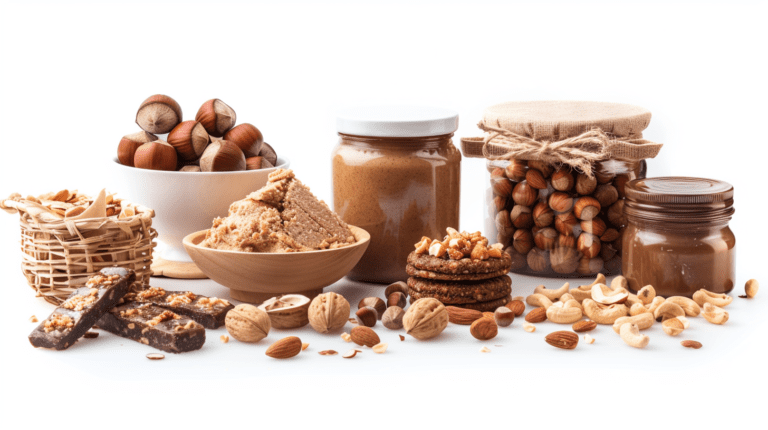How Hazelnuts Benefit Vegan Diets: Health and Versatility
Hazelnuts have been gaining significant traction in vegan diets in recent years, becoming a staple ingredient for many plant-based eaters. This surge in popularity can be attributed to their versatility, nutritional profile, and unique flavor. Let’s explore the various aspects of hazelnuts that make them increasingly appealing to those following a vegan lifestyle.
Nutritional Powerhouse
Hazelnuts are packed with essential nutrients that make them an excellent addition to vegan diets. They provide a well-rounded nutritional profile that supports overall health and well-being.
Macronutrients
Hazelnuts are an excellent source of healthy fats, particularly monounsaturated fats, which are known for their heart-healthy properties [1]. These fats can help reduce bad cholesterol levels and support cardiovascular health. Additionally, hazelnuts contain a modest amount of protein, making them a valuable protein source for vegans who may struggle to meet their daily requirements [2].
The carbohydrate content in hazelnuts is primarily in the form of dietary fiber, which aids digestion and promotes gut health [2]. This fiber content also contributes to a low glycemic index, helping to maintain stable blood sugar levels.
Micronutrients
Hazelnuts are rich in various vitamins and minerals that are crucial for optimal health [1],[2]:
- Vitamin E: A powerful antioxidant that protects cells from damage and supports skin health.
- B vitamins: Including folate, which is essential for cell function and tissue growth.
- Magnesium: Supports muscle function and overall cellular health.
- Calcium: Essential for bone health and muscle function.
- Iron: Vital for oxygen transport in the blood.
- Zinc: Supports immune function and wound healing.
- Potassium: Helps regulate blood pressure and supports heart health.
Antioxidants
Hazelnuts are packed with antioxidants, including tocopherols, phenolic acids, and flavonoids [2]. These compounds help combat free radicals in the body, potentially reducing the risk of chronic diseases and supporting overall health.
Versatility in Vegan Cooking
One of the key reasons for the increasing popularity of hazelnuts in vegan diets is their versatility in cooking and baking. They can be used in a wide range of dishes, from savory to sweet, adding depth of flavor and nutritional value.

Savory Applications
Hazelnuts can be incorporated into various savory dishes, enhancing both flavor and texture [3]:
- Romesco Sauce: A traditional Italian sauce that combines hazelnuts with almonds, tomatoes, and roasted peppers.
- Spanish-Style Chard: A side dish that pairs Swiss chard with toasted hazelnuts and sweet raisins.
- Vegan Pumpkin Alfredo: A creamy pasta dish topped with roasted hazelnuts for added crunch.
- Wild Fennel Pesto: An innovative pesto recipe that incorporates hazelnuts and dates for a unique flavor profile.
- Mushroom and Hazelnut Pâté: A hearty spread made from mushrooms, lentils, and hazelnuts.
Sweet Treats
Hazelnuts are perhaps best known for their role in sweet dishes and desserts [3]:
- Homemade Vegan Nutella: A plant-based version of the popular chocolate-hazelnut spread.
- Raw Chocolate-Hazelnut Truffles: A simple yet decadent treat made with just a few ingredients.
- Chocolate Chia Tart with Hazelnut Crust: A rich dessert featuring a flavorful hazelnut and date crust.
- Hazelnut Cheesecake Smoothie: A creamy, indulgent smoothie that can be enjoyed for breakfast or dessert.
- Vegan Hazelnut Chocolate Chip Cookies: A gluten-free, oil-free cookie recipe that showcases the rich flavor of hazelnuts [4].
Hazelnut-Based Products
The popularity of hazelnuts has led to an increase in hazelnut-based products catering to vegans:
- Hazelnut Milk: A creamy, nutty alternative to dairy milk that can be easily made at home or purchased [3].
- Hazelnut Butter: A spread similar to peanut butter, but with the distinct flavor of hazelnuts [4].
- Hazelnut Flour: A gluten-free alternative to wheat flour, often used in baking.
Health Benefits for Vegans
The inclusion of hazelnuts in vegan diets offers numerous health benefits that align with the goals of plant-based eating.
Heart Health
Hazelnuts are particularly beneficial for cardiovascular health. Their high content of monounsaturated fats and antioxidants can help reduce LDL (bad) cholesterol levels while maintaining or even boosting HDL (good) cholesterol [1]. The presence of magnesium and potassium further supports heart health by regulating blood pressure and promoting healthy heart rhythms [2].
Brain Function
The essential fatty acids and Vitamin E found in hazelnuts play a crucial role in maintaining and enhancing cognitive functions. Omega-3 and omega-6 fatty acids support brain cell growth and neurotransmitter functions, potentially aiding memory and concentration. Vitamin E has been linked to reduced cognitive decline, making hazelnuts a smart choice for brain health [2].
Weight Management
Despite their high caloric density, hazelnuts can be beneficial for weight management when consumed in moderation. The combination of protein, healthy fats, and dietary fiber ensures a steady release of energy and promotes satiety, which can help control appetite and prevent overeating [2].
Bone and Joint Health
For vegans who may be concerned about calcium intake, hazelnuts offer a plant-based source of this essential mineral. Along with magnesium and phosphorus, the calcium in hazelnuts contributes to maintaining strong bones and joints, potentially reducing the risk of osteoporosis [2].
Digestive Health
The fiber content in hazelnuts supports digestive health by promoting regular bowel movements and supporting a healthy gut microbiome [2]. This is particularly important for vegans, who typically consume higher amounts of fiber-rich plant foods.
Sustainability and Ethical Considerations
The increasing popularity of hazelnuts in vegan diets also aligns with the environmental and ethical concerns that often motivate people to adopt a plant-based lifestyle.
Environmental Impact
Compared to animal-based protein sources, hazelnut production generally has a lower environmental impact in terms of water usage, land use, and greenhouse gas emissions. However, it’s important to note that like all crops, hazelnut farming does have some environmental considerations, such as water usage and potential habitat disruption.
Ethical Production
As demand for hazelnuts grows, there’s an increasing focus on ethical production practices. Consumers are becoming more aware of labor conditions in hazelnut farming and are seeking out brands that prioritize fair labor practices and sustainable farming methods.
Challenges and Considerations
While hazelnuts offer numerous benefits for vegan diets, there are some challenges and considerations to keep in mind:
Allergies
Tree nut allergies, including hazelnut allergies, are relatively common. Individuals with nut allergies need to be cautious and avoid hazelnut products.
Caloric Density
Hazelnuts are calorie-dense, providing about 176 calories per 28-gram serving [2]. While this can be beneficial for those looking to increase their caloric intake, it’s important to be mindful of portion sizes to avoid unintended weight gain.
Cost
Depending on the region, hazelnuts can be more expensive than other nuts or plant-based protein sources. This may make them less accessible for some consumers.
Conclusion
The increasing popularity of hazelnuts in vegan diets is a testament to their nutritional value, versatility, and delicious flavor. From their heart-healthy fats to their brain-boosting nutrients, hazelnuts offer a wide range of benefits that align well with the goals of plant-based eating. As more people adopt vegan lifestyles, it’s likely that hazelnuts will continue to play a significant role in plant-based cuisine, offering a nutritious and tasty option for those seeking to diversify their diets while adhering to vegan principles.
Sources:
[1] https://www.webmd.com/diet/health-benefits-hazelnuts
[2] https://premiumgrowers.com/the-health-benefits-of-hazelnuts/
[3] https://hazelnuts.com/general-news/14-delicious-vegan-hazelnut-recipes/
[4] https://thevegan8.com/cinnamon-hazelnut-chocolate-chip-cookies-gluten-free-oil-free/
[5] https://www.medicalnewstoday.com/articles/323807
[6] https://www.healthline.com/nutrition/hazelnut-benefits
[7] https://www.vegmeup.com.au/the-growing-popularity-of-plant-based-eating/
[8] https://moonandspoonandyum.com/vegan-hazelnut-cream-cheese/
[9] https://www.imarcgroup.com/hazelnuts-pricing-report






